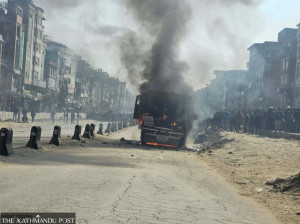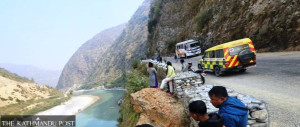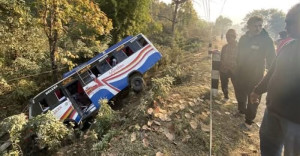Bagmati Province
Congress rift deepens in Bagmati as four ministers quit
Majority of lawmakers back no-confidence motion against Chief Minister Lama, push for Baniya as new chief minister.
Subash Bidari
Four ministers from the Bagmati provincial government resigned on Friday amid internal power struggles within the Nepali Congress.
Minister for Internal Affairs and Law Suraj Chandra Lamichhane, Minister for Youth and Sports Min Krishna Maharjan, Minister for Culture and Tourism Bimal Thakuri, and Minister for Cooperatives and Poverty Alleviation Madhu Kumar Shrestha tendered their resignations.
Shrestha said the resignations were aimed at changing the leadership in the parliamentary party.
“We are against Chief Minister Bahadur Singh Lama and support Indra Bahadur Baniya as the new parliamentary party leader,” Shrestha said. He said the move aligned with an earlier agreement to reshuffle the government after one year in office.
“We are still technically part of the Lama-led government, but we have resigned in support of Baniya,” he said.
Lama was sworn in as chief minister on July 24 last year.
Lawmakers from the Nepali Congress have begun to replace Lama as the party’s parliamentary leader and chief minister. On Friday, they submitted signatures to formally initiate his removal.
Led by Baniya, who also serves as the Congress Bagmati Province chair, 21 out of 37 party lawmakers have submitted a no-confidence motion against Lama. The signatures were handed over to Krishna Kumar Tamang, secretary of the provincial parliamentary party.
A no-confidence motion against the parliamentary party leader requires the backing of at least 25 percent of its lawmakers. With more than 50 percent now in support, the process to appoint a new leader will move forward, said lawmaker Thsering Dorje Lama.
He said the party statute allows the parliamentary secretary to convene the next meeting to carry the process forward.
The no-confidence motion against Lama accuses him of poor leadership in his earlier stint while the CPN (Maoist Centre) led the government. It also accuses him of being lackadaisical during the budget-making process, leading to frustration among party members.
It further alleges that Lama, even while heading the Congress-led government, failed to implement the allocated budget effectively. The proposal cites weak revenue collection, poor expenditure performance, and inadequate public service delivery.
The lawmakers also criticised Lama for the government’s inaction in providing relief and prioritising reconstruction following September’s floods. They pointed to a lack of coordination between the party, the parliamentary party, and the government in political appointments.




 22.11°C Kathmandu
22.11°C Kathmandu















